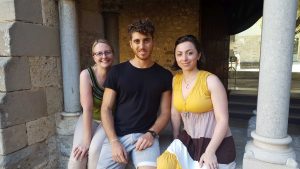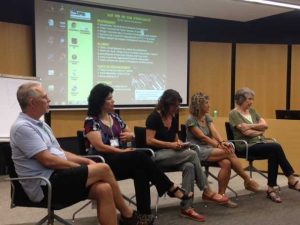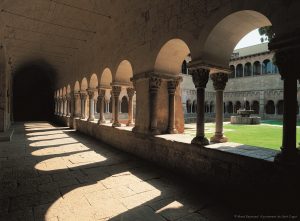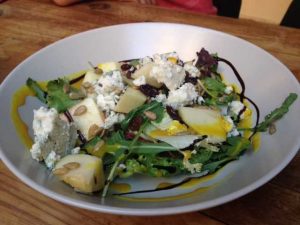Migration, food policy, and a monastery
By Shanon Dickerson, Nadinne Ivette González Romero , and Davide Zarri

Shannon, Davide, and Nadinne
Today was a long day! It began with several presentations and the first topic was migration. Migration is one of the main problems that rural areas face as people leave to seek opportunities in urban areas. Although some migration is voluntary, unfortunately, it can also be forced.

Migration panel
To better understand the concept of migration, we worked together in groups to share our personal experiences. We learned that women’s experience of migration is different from men’s, individuals returning from urban areas to rural areas are often perceived as a failure, and that there are now new policies in place that encourage individuals to return to rural areas. We also discussed issues regarding unskilled inward migration as well as skilled outward migration.
The second topic of the day was a discussion of food policies. We were introduced to the issue of food waste and global food security challenges. The majority of food waste comes from the end consumers and is mostly avoidable. To help reduce this problem, governments need to create policy in order to inform consumers and to reduce industrial food waste by requiring producers to consider innovate ways to prevent waste streams. In addition, we discussed an example of food security in Barcelona, its food banks. They are mostly run by volunteers and help to reduce the food waste problem. We also took part in an interesting activity where we had to take opposite sides as to whether food waste was a problem or not. We felt that the group that had to defend that food waste was not a problem was definitely given the unfair end of this challenge, but they did a great job playing devil’s advocate.

SANT CUGAT Monastery
ICRPS not only teaches participants about theory, but it also provides insight into the local culture. In the afternoon, we went to St. Cugat Monastery where religion is a symbol of Catalonian identity and culture. On the tour, we saw how art evolved through the ages and we got to see inside the cloister.
After touring the monastery, we ended the day with a delicious dinner at Taverna Cal Temerari where we ate a variety of tapas and enjoyed regional wine. Unfortunately, some of us experienced first-hand our lesson on food waste as we were not able to eat all of the food provided. However, we can all agree that the salad was good and the dessert was amazing!

Salad from Taverna Cal Temerari
